theartsdesk Q&A: Musician Seasick Steve | reviews, news & interviews
theartsdesk Q&A: Musician Seasick Steve
theartsdesk Q&A: Musician Seasick Steve
US bluesman talks about his life, new album - and Tears for Fears
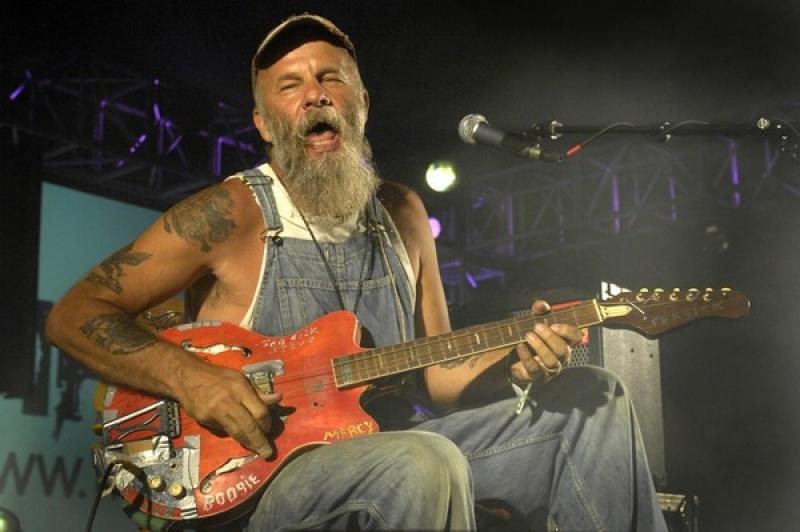
Seasick Steve Wold (b 1941) has achieved widespread popularity over the last five years with his raw, rootsy, blues-flavoured sounds. He's also renowned for his customised guitars, such as one featured on his new album, You Can't Teach an Old Dog New Tricks, that's made from Morris Minor hubcaps, and for his stage patter which combines US Southern charm with hobo lore and anecdotes.
Wold left his Californian family home in his early teens after falling out with his stepfather and spent many years hopping freight trains and working as an itinerant labourer. Over the decades he travelled all over, winding up in Sixties San Francisco and various European destinations. He often busked for money and was engaged with music-making at a low level until the Nineties when he created a studio in Olympia, Washington, where he recorded early material by a number of bands who went on to greater things, notably Modest Mouse.
Moving to Norway in the new century - the homeland of his wife Elizabeth - he attempted to kick-start his career with the album Cheap but was stopped in his tracks by a heart attack. Through a chain of unlikely circumstances (detailed in this Q&A) he ended up appearing on Jools Holland's New Year's Eve Hootenanny in 2006 which launched his career overnight. Since then he has had a succession of successful albums, including I Started Out With Nothing and I Still Got Most of It Left and Man From Another Time.
I meet Seasick Steve in a cosy nook in Black's Club in Soho where he's perched on an array of cushions and drinking red wine - he will drink a bottle during our interview. His demeanour is part drawling good ol' boy truck driver and part mischievous weathered Zen sage. The waiter attempts to replace his glass with a fresh one but he says, "I like a dirty glass, don't want to get too fancy. I know them is my paws on there," and laughs.
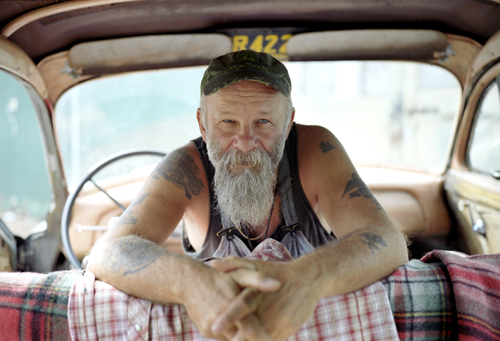 THOMAS H GREEN: On your new album you have John Paul Jones playing bass on a couple of tracks. Did you ever see Led Zeppelin live?
THOMAS H GREEN: On your new album you have John Paul Jones playing bass on a couple of tracks. Did you ever see Led Zeppelin live?
SEASICK STEVE: I saw them play in 1969. I was playing at a pizza parlour and this guy came in and asked if I wanted to see an English blues band. We went over to this amphitheatre and saw them play. Man, they was good. I didn't think of them like a blues band but I thought I ain't ever seen [imitates Robert Plant swinging microphone by its lead]... and the hair, plus they was so much better than everybody else. I'll never forget that show. I went backstage and saw that Robert Plant was smoking English cigarettes. I'd never seen an English cigarette before in my life so I bummed one off him. That was my big claim. I now know Robert Plant quite well and I told him but he don't remember. It tasted like shit. I was smoking Lucky Strikes at the time and that cigarette tasted poor, poor, poor. I felt sorry for him - "Man, you call that a cigarette?"
Your new album delves into American roots music, acknowledging that blues and country often derive from the same source.
I'd never thought about my music being the blues. When I was a kid there weren't all these lines. Some real black music came under "Race records" but in general it was all kind of mixed up. I never thought of myself as a blues person. When I was a kid, blues people were black people living on a farm or something. I always thought I played hillbilly music. You know what? When no one's listening you don't need to reflect too much on what you play because no one's asking. When I play music in my home it's not like my wife's going, "Oh, what kind of music is that?" I was just being noisy. The one time I thought about it was when I got asked to play a couple of songs with [the late Mississippi bluesman] RL Burnside in 1996. Someone said, "We need someone who knows how to play old-style blues." I thought, "Do I play that kind of music?" It was the first time I reflected on it but nothing more happened until I was in England and people were saying, "You play the blues," and I was, like, "Wow! Do I?"
There's a song called "Treasures" on the new album that reminds me of Johnny Cash's later American Recordings.
I don't even know why I did that song. One day I was sitting remembering what it used to be like wandering round, everybody looking at you like you'd come to rob their place: "I don't even want to be in your place - me, I sleep out in the park, thank you very much." I love Johnny Cash. I remember before he died he had some songs out but I didn't get to hear too much. Someone played me a little bit one time when they wanted me to get a producer - Rick Rubin - but I said, "I don't want no producer." They played me some of his tracks, amazing, him singing when he knew he was going to die, he was singing some way else.
Watch the video for "Treasures"
Why has your career seen you hop between so many different record labels?
I was with Warner-Atlantic for three years, something like that, but I only went with them for a certain reason. I was with Bronzerat [Records] but the guy Andy [Zammit] who was doing the label, the shit was getting too big. At the same time my wife was working at an old people's home. She was killing herself and she didn't believe I was doing good so she wouldn't quit her job. It was actually hurting her. The only way she was going to quit this job was if I gave her a chunk of money so I sent out the idea that I may be available but I had no idea all these people wanted to sign me - but they did.
So I got this chunk of money and she still wouldn't quit her job. I signed to Warners and kind of lied to her a little bit. I got Andy to call his friend, that guy from The Darkness, Dan [Hawkins], who had a little studio in Norfolk. I told my wife the record company was making me go to a studio, that I'd have to stay there for a few weeks and that I wouldn't do it unless she came along. They weren't making me do nothing really but she took two weeks' absence from work.
Now I could have made that record in two weeks but I said, "Everything's going wrong, I need to take another two weeks," so she took another two weeks absence. I stayed there a couple of months and spent a shit-load of money but she lost her job in the end. Once she'd been away from it five or six weeks she began to see how the job had been really killing her. I got myself into a bad deal but it was a good deal because she quit. For the most part she's come with me ever since.
The English have long enjoyed the mythology of the blues so when people hear that you were taught the rudiments of guitar by KC Douglas, who wrote the much-covered song "Mercury Blues" back in the Forties, they latch on to that.
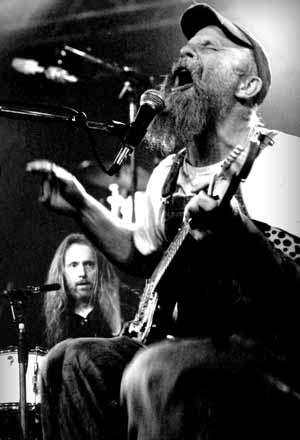 I didn't know he played blues, I was a kid. My dad was a boogie [piano] player and if I was to think about music in any terms it'd be boogie-woogie but I didn't. KC sounded like a country musician. He used to talk about busking with Tommy Johnson but I didn't know who Tommy Johnson was. KC was the first person I heard about busking from and later, when I was a teenager, and I started busking, that was why. I learned that when you play on the street you can make a few bucks - it was that straight-up.
I didn't know he played blues, I was a kid. My dad was a boogie [piano] player and if I was to think about music in any terms it'd be boogie-woogie but I didn't. KC sounded like a country musician. He used to talk about busking with Tommy Johnson but I didn't know who Tommy Johnson was. KC was the first person I heard about busking from and later, when I was a teenager, and I started busking, that was why. I learned that when you play on the street you can make a few bucks - it was that straight-up.
KC died in 1971 or 1972 [he died in 1975], he wasn't famous or nothing. He worked for the refuse department in Berkeley and Oakland cities. I don't know if I saw him since 1970 but just now at my gig in San Francisco a security guard came backstage and said, "KC Douglas is here to see you," and I go, "No, he ain't 'cause he's deader than a doornail. You tell whoever's saying that, that they're full of shit." But the security guard had got it wrong - it was a friend of KC's. He came backstage and it was his 80th birthday. He'd come 100 miles to see me play. His name was Clarence and, man, we had the greatest time talking about KC.
KC's song became a hit way after he was dead. He wasn't nothing, just worked for my grandfather for a while. He just taught me some basic chords. I think I learnt that "Big Road Blues" thing. It was just nothing.
When you went to Paris in 1972, was that the first time you'd been to Europe?
Yes, I don't think I really knew where Europe was. I just got a charter ticket, $100 one way, and landed at Charles de Gaulle airport with $10. I just stood there with a bewildered look at the airport and somebody asked me, "What do you want to do?" "Play guitar." "Go play in front of cafés." They told me what they should've, to go to St Germain, and I played on the street. I slept in Luxembourg Park which closed at 6pm so I'd sneak in and sleep in the bushes by a gazebo, come out in the morning and start again. I'd been playing on the streets a long time before I figured out there was a metro. I didn't understand where everyone was going. I thought it was a toilet.
You stayed in San Francisco in the mid-Sixties. Were you ever swept up in the whole utopian, Timothy Leary, change-the-world bit?
Oh, I wanted to but I didn't fit in so good. I was a little rough around the edges. I wanted to be a hippy. What I liked about it was you could go sleep in anybody's house and there were girls everywhere. These people called the Diggers would come and feed you for free. They'd bring this soup truck onto the pan-handle there and, miraculously, food would show up. Peter Coyote was one of them. Everything was a little bit magic there. I remember standing on a street corner somewhere off Haight Street playing harmonica. I was completely out of my mind and I don't play harmonica too good either. Some girl called down from her window, "Come on up." It seemed natural at the time to get fucked up and fucked, it just was normal. It was amazing for a short period of time.
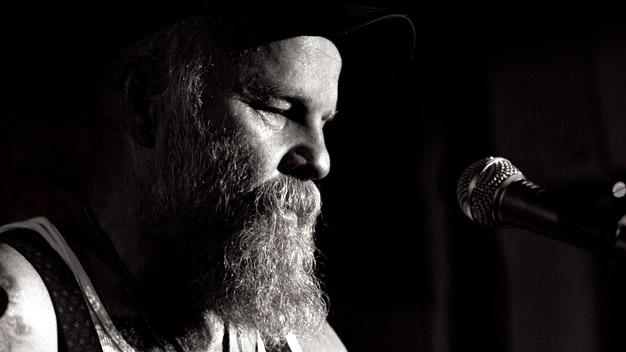 I'd never really been back there but I was there just now. The last time I busked on Haight Street was 1967 but I just busked there now. Me and Dan [Magnusson, the drummer] who I play with, we sat on Haight Street and busked. We made $89 in 35 minutes. We had a pile of money and it was a little bit windy so it was blowing down the street. People would go and get it for us. We had such a good time.
I'd never really been back there but I was there just now. The last time I busked on Haight Street was 1967 but I just busked there now. Me and Dan [Magnusson, the drummer] who I play with, we sat on Haight Street and busked. We made $89 in 35 minutes. We had a pile of money and it was a little bit windy so it was blowing down the street. People would go and get it for us. We had such a good time.
The funny thing was that every once in a while someone from England would walk by and go, "Hey, I bought tickets to see you at the Isle of Wight Festival. Are you all right?" They thought I'd fallen on hard times because we were sitting on the street, and Dan's an old guy too. They couldn't understand why we was busking. For me it meant something.
It was a beautiful hot day and they've painted the houses all colourful, and there were people walking by with patchouli oil on. If I had my eyes half-shut I could almost imagine it was 45 years ago. I saw one old guy but he only came there in the Eighties. I bet I was the only motherfucker on the street who lived there back then. Some college girls came up and wanted to know about how it used to be so I go, "Girls, you've probably asked the only guy who used to live here then." They were so happy.
Tell us a bit about Dan Magnusson?
Dan lived in Sweden in a tiny town called Amal and he'd never done nothing really so all this is just as crazy for him - it's like getting picked out of a mud puddle and put in the Albert Hall.
The great blues singer Leadbelly, once he'd achieved some success, fell out with his mentor, the American folklorist Alan Lomax, over the idea he should keep performing in denim work overalls rather than a sharp suit. Do you have any such qualms?
I wear them at home pretty much all the time. I've kind of stopped wearing them when I play because they were getting so worn out, they're almost like pyjamas. I don't give a shit. Maybe them black people they did used to dress them up, but I grew up wearing them. The God's truth is that if I get a little bit fatter I get tired of wearing a belt and overalls are so comfortable.
I understood later that people thought I was trying to be like a farmer but I am a farmer, I have two tractors. You go to Iowa, or somewhere like that, all the guys are wearing overalls still. They wear 'em 'cause they feel nice. I got me a new pair but the butt's worn out so I need to sew a patch on 'em. They're pretty good ones. Soon as I get home the first thing I do is put on my overalls.
Glastonbury is approaching once again. Do you believe in all that ley line stuff, that the place has a truly cosmic vibe?
Well, I know it's my favourite festival. Last year when I stood there and played to 100,000 people, I ain't never gonna forget that, ain't nothing to do for me after that. If it all goes away now, I've done it. I love Glastonbury, I don't even know why. I don't know if it's something mystical, I put it down to the people. It's one thing to be in that audience but to have that audience all pointed at you, that's something only a few people get to experience.
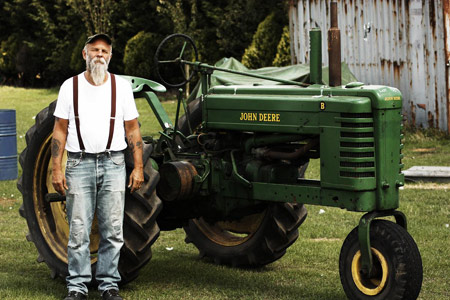 Do you chat with Michael Eavis? You're a similar age.
Do you chat with Michael Eavis? You're a similar age.
Yeah, we've hung out a lot. I like him. Two years back I played that Pilton Party he does. Mainly we talk about farming as he has a dairy farm. We talk about tractors. He invented a gigantic electro-magnet that goes on the front of the tractor and pulls up all them tent pegs because his cows were swallowing them and dying. Stupid fucking animals! How can a cow eat a tent peg? They gotta be dumber than a box of rocks. The magnet gets a million tent pegs out of the ground because people leave all their shit there.
You were an itinerant labourer on farms in your youth. What was the most arduous job?
Picking apples, that kicked the shit out of me. You're up in a tree and you need to pick so many bags to make a bin. Maybe some of the Mexicans who were really pro, they liked it, but I hated it. Also I'd eat apples whilst working so by the second day I'd hate the sight of an apple which would make me slower. You'd work all day and make fuck all.
So which was the easiest job?
What I liked was when you got a job on a farm building fences. I didn't like piecework so much. I liked it when you'd get paid by the hour to dig a ditch, build a fence, put a roof on a barn, or just maintenance work, working outside, not in a rush. If you'd get on a good farm you'd make the most money too.
The video for "Cheap" placed an early image in the public mind of what you were like. It makes being a bum look like good fun.
We didn't mean that. We were down in Mississippi where we filmed it on a home camera but the guy who did it [Eirik Tyrihjel] was good at all that stuff. He lived in Clarksdale, worked for Turner Entertainment, did CNN shit. The song was just a funny song I wrote about a time that I had. There was not homeless people, per se, back then, I never even heard that word. Most of the fellows I met on the bum, they were there because... I don't want to say they wanted to be, but it wasn't a degrading thing, begging for stuff. Most of the guys were working when they could. There was a sort of pride in being able to take care of yourself, however the dice would roll. So that song's about that, but [that lifestyle] ain't around no more.
Watch the video for "Cheap"
Jack Kerouac and the beatnik writers gave all that On the Road stuff a certain romance.
I ain't never met a beatnik on the road, never met Jack Kerouac either, and never read his books. Most of the fellows I met were from the war, either Korea or World War Two. That's if I was ever to find out - most people don't talk about why they're on the road, that's not a conversation. I met beatniks in San Francisco. They hung out on North Beach and they was into jazz - cool, daddio, they had goatees and turtlenecks. They was older too, in their thirties and forties back then, 35 in 1966. They listened to poetry and someone playing the saxophone. That was not my scene. Never, ever did I meet one of these fuckers on the road, no students, just people who something had happened in their lives, problems with the police, lost their family, drinking, them guys from the war who never fit back in.
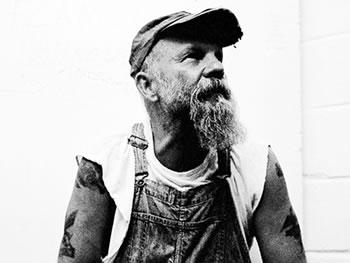 In the early Eighties you washed up in London. Did you get into the music scene of that time?
In the early Eighties you washed up in London. Did you get into the music scene of that time?
I tried. I had a new wife back then - Elizabeth. In the Seventies I gave up thinking I could be in a band and my greatest thought to make money was to write a song someone else would do, but that didn't happen. We had a new baby so we were kind of tied down but I remember I went to a ZZ Top concert the first time they played England at Wembley. That was a big deal.
The other strange thing I remember was someone gave me a vinyl copy of a record by Tears for Fears but I didn't have a record player because we were living in hotels so I never got to hear it. It was before the record came out and before the band were big. At the end of my time in England we were going to Norway and I was in Victoria Station with the baby and all the suitcases. I didn't know what to do with this record. I found some girls and they looked real suspicious of me and I said, "This is going to be the next big thing - do you want this record?" And they took it. I've no idea what they thought of it and I've often wondered.
Is it true that the eclectic London radio station Resonance FM boosted your career?
Joe Cushley, who was a DJ there, did. When we made Cheap no one would put it out and we was in Norway. I think we printed it up ourselves, made a little record company with a friend of mine in Mississippi, 500 of 'em or whatever the minimum was.
There was a guy in Norway who was a writer and he used to play at blues festivals. He was on an internet thing and told Joe Cushley about us. Joe's a huge blues fan with a show called Balling the Jack and he asked this guy to send him a CD. He loved it and asked us to be on his show so we came to London and played on his radio show and played a little gig at the 12 Bar Club. Nothing much happened but Mark Ellen from The Word magazine heard about us and Joe got me on Charlie Gillett's radio show too. Joe was 100 per cent instrumental. We played a couple of times in England but just for 20 or so people. Actually, John Paul Jones came to one of them shows. Then I went back [to Norway] and got sick so that was the end of that.
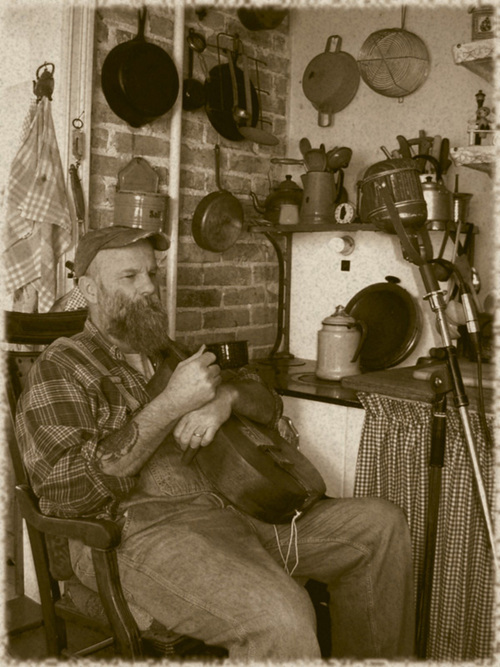 The only reason I got on Jools Holland was down to Joe too. I quit playing as I was so sick and after a while my wife saw that I was not coming round so she said, "Why don't you go in the kitchen and just start recording some songs again for me?" So I did that. I had a little four-track tape recorder in there.
The only reason I got on Jools Holland was down to Joe too. I quit playing as I was so sick and after a while my wife saw that I was not coming round so she said, "Why don't you go in the kitchen and just start recording some songs again for me?" So I did that. I had a little four-track tape recorder in there.
Joe called to see how I was doing and I told him I was recording in my kitchen. He said, "I really want to hear it," and I said, "Oh, no, I don't think you do," because it was recorded in mono on an old tape recorder. He insisted I sent it to him, and said it was great and we needed to get it out.
He asked a few people but no one was interested but this guy Andy [Zammit], he had a little record company [Bronzerat] putting out records by his girlfriend [Gemma Ray]. Joe told me he'd love to put my record out. I wasn't so interested any more but I called Andy and said, "I don't care what you do but have you got any money to put it out?" He didn't, so I said, "How are you going to put it out then?" He borrowed £1000 from his sister and printed up 900 CDs.
Now both Mark Ellen and Charlie Gillett told [Later... with Jools Holland producer] Mark Cooper about me - I didn't know about any of this at the time. Andy was driving bands around and he took [American singer-songwriter] Richard Swift to the Jools Holland show and Richard Swift mentioned me to Mark Cooper one more time so they said, "Yeah, we'd like to see him play."
Andy set up a gig for me to play at St Aloysius Social Club beneath a church. Turned out [Jools Holland's people] couldn't come to the gig so they came to the soundcheck, except there was no soundcheck because there was no PA, so I just played like that for them. I didn't know what Jools Holland was so it didn't much matter to me, and it sounded pretty bad too. They just sat on two folding chairs and didn't say nothing. There was no one else there, then they thanked me and walked away.
They called Andy that night and said, "We're going to have Steve on the Hootenanny." My boy had made me a website that had had 75 visits. The week after the Hootenanny it had 1,750,000. It crashed completely and I was off on the road to festivals and everything came from there.
Watch Seasick Steve on Jools Holland's New Year's Eve Hootenanny
Your son Paul wrote the song "Whisky Ballad" on the new album which is a cracker.
Ooh, he's going to be happy to hear that.
Were you proud of him?
Not at the time. He wrote it when he was 16 so I felt it didn't really reflect on my parenting skills, but he don't drink hardly no more. He kind of went through that stage but even then that song has a lot of wisdom.
"Whisky Ballad" celebrates alcohol. Do you think there's a modern tendency to pathologise hedonism? There's this whole culture of rehab and absolution?
If you can't behave properly then you don't get to do it any more. If you fuck it up then you're done, then you get to be a teetotaller. That's all right but it's not for me. I feel sorry for people who fuck it up. I'm really lucky because I've never had the hook. Some people can take one drink and they're fucked. I've done hard drugs, shit like that, even smoking cigarettes, and I didn't have the hook, I could just stop so I was born lucky that way.
I was once in Texas and came across a town called Utopia that had 17 churches and no bars. It didn't strike me as Utopia.
If I ever drive by that town I will drive by it. It ain't got a bar, it ain't got me, I can tell you.
Do you think the American South has a conflicted relationship with alcohol?
Oh yeah. There's still dry counties where you can't buy booze in Tennessee and Georgia but it seems sort of normal when you grow up there. It's just retarded. Obviously it's completely crossed up but rock'n'roll was created in that crossed-up-ness.
If it wouldn't have been for that crossed-up-ness down in Memphis there wouldn't have been any rock'n'roll at all. That's a heavy thing - no Elvis, no Jerry Lee, no Carl Perkins, no blues, no rock'n'roll. Who else would've invented rock'n'roll? I struggle to think. It's so fucked up down there, people had to play some rock'n'roll, blues and jazz, all of it created out of that mess.
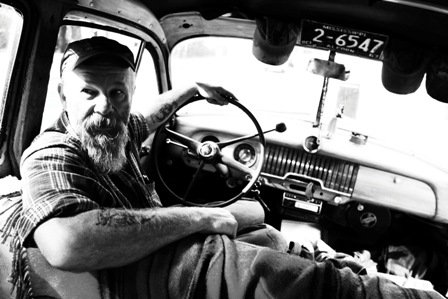 Do whisky companies ever ask to sponsor you?
Do whisky companies ever ask to sponsor you?
I've been waiting. Jack Daniels got smart and realised I'm a walking advertisement and they don't even have to pay me, so I try to have wine on stage now and drink JD round the back. I have a bottle of JD with me right now [rummages in his bag to show a small half-drunk bottle] but they wise to me.
Your son Paul is a musician, Didrik is a graphic designer and your manager - what does your third son do?
He's a physicist. His name's Henry. He has a band. Last year he came out on the road with us taking care of the drums but now he's just done his Masters in physics. I think he's going to do a doctorate now. He's real smart. If he didn't look so much like me I'd want to do a DNA test and make sure we was related.
Your main and most renowned guitar, the Three Stringed Trance Wonder, was famously bought for $75 from a junk shop by a pal of yours called Sherman Cooper - who is he?
He lives on this old farm out there in Mississippi. He's loved music his whole life. He used to drive Mississippi Fred McDowd to gigs when he was too drunk. Fred lived in the same town.
Sherman's around 66. He knows Robert Plant now. I introduced them. Sherman asked me, "I know I've heard that name but I wasn't so much into rock'n'roll back then, I was into the blues." Then he went into the Good Will [thrift store] in Como, the same place he found that guitar of mine, and found these Led Zeppelin records. "Oh, I remember them now!" He's right on Planet Z. We're buddies. He used to farm. He has 800 acres, but he gets paid by the Government not to do anything with it 'cause it's historic. That farm used to be 20,000 acres and it's been in his family since before the Civil War.
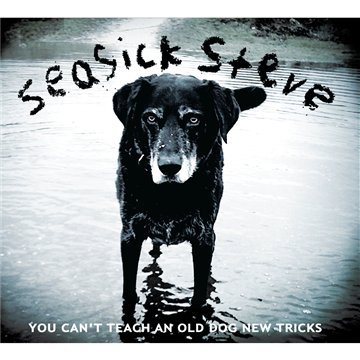 Is Claire Sambrook, whose photo of her dog Twm is on the front of You Can't Teach an Old Dog New Tricks (pictured left), a friend?
Is Claire Sambrook, whose photo of her dog Twm is on the front of You Can't Teach an Old Dog New Tricks (pictured left), a friend?
I've never met Claire. I told my wife I wanted to find a picture of an old dog that looked like me and she found this one. My boy found out how to get hold of the girl and ask permission. I've never met her or the dog but I'm really hoping to meet the dog 'cause he's kind of old, 13, so I don't think he might be round for a whole lot more.
Your stepfather treated you badly when you were a boy. Do you think he was affected by his time in the Korean War or was he just plain mean?
His family were from Guatemala and all them smack each other all the time. I don't think it had nothing to do with fucking Korea. His mum smacked him and his grandmother smacked her, they just smacked everybody but he was a little over the top. Everybody got smacked back then, we live in a pussy world now. I don't ever smack my kids so I'm a pussy too. I was as big as I am now when I was 12 and he got into this punching thing, so that motherfucker's lucky he's still breathing... although I imagine he's dead by now - it was a long time ago.
Did you maintain contact with your mother?
No. One time when I had some kids from my first marriage I wanted to show her but it was a non-goer. She can rot.
By the early Fifties singers such as Woody Guthrie, Pete Seeger and Rambling Jack Elliott had very much associated American roots music with protest and even socialism. What did you think about that?
I like Rambling Jack. I met Darrell Adams wandering around Europe in the Seventies. He was one of the Almanac Singers who'd left America after the Korean War in protest. He said to me, "When you get back to America and run into Rambling Jack give him a kiss on the cheek and a pinch on the butt from me." I go, "Darrell, America's a big place," but sure enough I ran straight into Rambling Jack when I got back. I said, "Jack, I'm supposed to give you a kiss on the cheek and a pinch on the butt from Darrell Adams but I'm not going to do it." I never knew about that protest thing, not until the Sixties, the only one I knew was the Almanac Singers singing "The House of the Rising Sun".
Do you suffer from any other kind of travel sickness apart from seasickness?
Carsickness is worse. Once it goes wrong, it's wrong and the end result is puking your guts up. The difference in a car is you can always pull over and say, "I've had enough now." You're stuck on a boat and you're fucked.
Is it true that you were pals with Kathleen Hanna of the feminist punk band Bikini Kill?
I can't say we were friends. When I moved from Tennessee out to Olympia [in the Nineties] I didn't move because of music. I moved to Washington [State] because my wife asked if there was any place in America that was like Norway. Washington has fjords and pines and is the closest thing America has. I used to avoid Olympia like the plague back in the Sixties because it was a redneck town, a logging town, so if you were hitching from Seattle to San Francisco and someone said they were going to Olympia you'd say, "No, thanks," because you'd get beat up.
Kathleen Hanna was the first person I recorded at my studio. I liked her but she was a teenager, maybe 20, and I was old. They were suspicious of me at first. I had no idea about punk and what they were doing. Then all these girl bands came, dyke bands. They'd look at me like some redneck guy but I don't have much of a deal about any of that so after about five minutes it was OK and I became the favourite girl-band studio.
Do you read much?
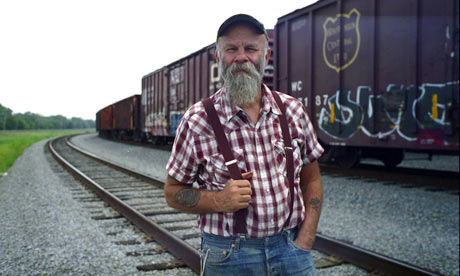 I do but I read really old books. I've got these old books from the Twenties and Thirties. I read them and then a few months later I read them again. It's a nice thing later on [in life] when you can't remember things no more. My daddy told me that you can read books and watch TV programmes again [when you've grown old] but I don't watch TV so I read them books over and over again.
I do but I read really old books. I've got these old books from the Twenties and Thirties. I read them and then a few months later I read them again. It's a nice thing later on [in life] when you can't remember things no more. My daddy told me that you can read books and watch TV programmes again [when you've grown old] but I don't watch TV so I read them books over and over again.
I like H Rider Haggard, I have tons of his books, and this guy Talbot Mundy who used to write pulp fiction back in the Twenties. He did a lot of weird shit, stuff about Afghanistan when the British were there. I've been reading them books since the Seventies. I'm starting to wonder about myself a little bit - I think I might have read some of them, like, 20 times. I'm reading another one now that I know I've read at least six times but it seems brand new.
Your new album has quite a few references to age and growing older - are you feeling your age more lately?
I feel it hard. I had a heart attack six years ago that almost killed me. I've struggled since then but success is a great medicine. I got a couple of tubes in my heart.
I don't waste no time. Going on playing makes me feel young but the body just wears out. I hope to stick around a while. I can feel like shit and I walk up on stage and all of a sudden, I don't know if it's adrenalin or the booze, but all of a sudden I feel a million dollars. Mainly it must be that incredible thing coming from the people but half an hour later I feel like I'm going to die, but you know what? So fucking what, if that's the way it's gonna roll, I'm all good with it.
Watch Steve Sick Steve play "It's All Good"
Explore topics
Share this article
Add comment
The future of Arts Journalism
You can stop theartsdesk.com closing!
We urgently need financing to survive. Our fundraising drive has thus far raised £49,000 but we need to reach £100,000 or we will be forced to close. Please contribute here: https://gofund.me/c3f6033d
And if you can forward this information to anyone who might assist, we’d be grateful.

Subscribe to theartsdesk.com
Thank you for continuing to read our work on theartsdesk.com. For unlimited access to every article in its entirety, including our archive of more than 15,000 pieces, we're asking for £5 per month or £40 per year. We feel it's a very good deal, and hope you do too.
To take a subscription now simply click here.
And if you're looking for that extra gift for a friend or family member, why not treat them to a theartsdesk.com gift subscription?
more New music
 Album: Nova Twins - Parasites & Butterflies
Exciting London duo turn inward and more introspective with their third album while retaining their trademark hybrid sound
Album: Nova Twins - Parasites & Butterflies
Exciting London duo turn inward and more introspective with their third album while retaining their trademark hybrid sound
 Music Reissues Weekly: The Beatles - What's The New, Mary Jane
John Lennon’s queasy, see-sawing oddity becomes the subject of a whole album
Music Reissues Weekly: The Beatles - What's The New, Mary Jane
John Lennon’s queasy, see-sawing oddity becomes the subject of a whole album
 The Maccabees, Barrowland, Glasgow review - indie band return with both emotion and quality
The five-piece's reunion showed their music has stood the test of time.
The Maccabees, Barrowland, Glasgow review - indie band return with both emotion and quality
The five-piece's reunion showed their music has stood the test of time.
 Album: Blood Orange - Essex Honey
A triumph for the artist who doesn't clamour for attention but just keeps growing
Album: Blood Orange - Essex Honey
A triumph for the artist who doesn't clamour for attention but just keeps growing
 Houghton / We Out Here festivals review - an ultra-marathon of community vibes
Two different but overlapping flavours of subculture full of vigour
Houghton / We Out Here festivals review - an ultra-marathon of community vibes
Two different but overlapping flavours of subculture full of vigour
 Album: Wolf Alice - Clearing
Ten years from their debut, Wolf Alice once again make magic from the familiar
Album: Wolf Alice - Clearing
Ten years from their debut, Wolf Alice once again make magic from the familiar
 Album: Deftones - Private Music
Deftones give us a glimmer of hope, but that's all...
Album: Deftones - Private Music
Deftones give us a glimmer of hope, but that's all...
 Album: Eve Adams - American Dust
Taking inspiration from the Californian desert
Album: Eve Adams - American Dust
Taking inspiration from the Californian desert
 Gibby Haynes, O2 Academy 2, Birmingham review - ex-Butthole Surfer goes School of Rock
Butthole Surfers’ frontman is still flying his freak flag but in a slightly more restrained manner
Gibby Haynes, O2 Academy 2, Birmingham review - ex-Butthole Surfer goes School of Rock
Butthole Surfers’ frontman is still flying his freak flag but in a slightly more restrained manner
 Album: Adrian Sherwood - The Collapse of Everything
The dub maestro stretches out and chills
Album: Adrian Sherwood - The Collapse of Everything
The dub maestro stretches out and chills
 Music Reissues Weekly: The Residents - American Composer's Series
James Brown, George Gershwin, John Philip Sousa and Hank Williams as seen through an eyeball-headed lens
Music Reissues Weekly: The Residents - American Composer's Series
James Brown, George Gershwin, John Philip Sousa and Hank Williams as seen through an eyeball-headed lens
 Album: Dinosaur Pile-Up - I've Felt Better
Heavy rock power pop trio return after an unwanted lengthy break
Album: Dinosaur Pile-Up - I've Felt Better
Heavy rock power pop trio return after an unwanted lengthy break

Comments
goin to see seasick Steve
that's 10/10/11 you hooch